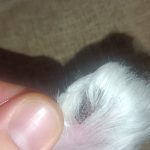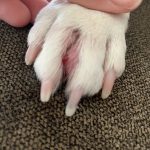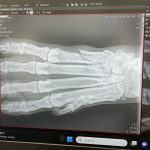Today I noticed a small lump on our 14 week old puppy’s lower abdomen. There are two but one is larger than the other. I’m assuming it’s her ovaries. No unusual behavior, eating and drinking normally. Is this normal for one to be enlarged? We have always had boy dogs so just making sure all is ok. Adding pictures for reference.
Comments
Hi there,
I have a 16 month old mix breed medium sized dog. I had her spayed 5 days ago and there’s a bulge to the left of the incision site (size of a tennis ball). Medium firmness.
The vet has suggested it be drained, but he’s 1.5 hours away and I’d rather not inflict another long journey and more trauma on her.
I’ve read that this could resolve on its own and want input as to whether I should take the trip (would you consider the swelling severe) or wait & see if it worsens/improves without intervention.
Thanks for any input.
Comments
Our 16mo Malteepoo has small patch of dried blood on tip of his ear ever since he was small!
I tried to get rid (peel) of it but Every time it returns bigger!
Comments
I have three dogs. One of my dogs, Angel a husky , jumped over my other dog Adonis, and missed so he landed on him. Ever since, he has been lethargic and he does have hip displasia as he is a pure breed Akita Inu.
Well we went in Friday September 1st to an emergency vet near us at around 5 or 6 pm with Adonis presenting limping and being lethargic and acting not like his normal self. After 30 minutes or so of waiting a technician came out and spoke to us saying how Adonis was very reactive when trying to examine him and asked if they could give him pain killers to soothe him and further inspect him. I told them verbally that they needed to put a muzzle on him because I know how he gets when you touch his legs and poke at him, after the tech came to talk to us we waited a total of 4 hours until they finally grabbed us and told us they thought it was his front paw because it looked “swollen” so they gave us an anti inflammatory and pain killer pills. When adonis was brought in he was able to walk but barely and when they handed him back to us he was unable to stand or walk or lift his head, once we got the paperwork, we were aware that pain killers were not given but he was given a sedative instead and no further examination was made after sedative was given as quote “we are very busy in the back”
Saturday September 2nd all day and Sunday September 3rd morning and part of the afternoon we were at the house watching over him trying to accommodate him as much as we could, we called the emergency vet place to ask for advice on how to relive Adonis since he had not been able to stand up since they gave him back to us Friday September 1st at 11pm and had been holding in his pee and poop.
Sunday September 3rd around 7 we took him back to the vet since they suggested they couldn’t give us advice since they didn’t know exactly what was wrong with him and were confused as to why he couldn’t walk, upon arrival to the vet they took him in on a gurney, and we were seated in an examination room. A tech came in and said to give them a few minutes to examine him, 20 minutes later the doctor came in to tell us she thought now the problem was a disk on his neck and suggested surgery or putting him down but leaned more towards putting him down because he is such a large dog. I asked for an x ray or an MRI but both were denied due to his size (130 lbs). The doctors only recommendation is to put him down and because of his large size nothing else was done and they further prescribed muscle relaxants. This visit lasted 40 minutes at most with very little options on how to further help Adonis.
Please help me understand what is going on and if putting him down is really the option or if this vet is being unethical or not doing enough for my dog. I just want to understand my options and how I can move going forward.
Comments
Pretty sure my baby has a interdigital cyst on her front paw. I am doing epson salt soaks Ans balm on it now and I have some augmentin left I’m going to start I’d there anything else I can do at home I work 12 hours today Ans tommottoe so can’t get her to the vet for at least 2 days. I feel so bad for my baby Ik it hurts
Comments
Hello my little pug has a ruptured anal gland. She is 4 years old , I squeezed it to get the pus out but then it started to hurt so I stopped I tried to get as much as I could I wouldn’t be able to talk her to the vet until Wednesday. Would she be okay or will she get worse if I wait that long . I’m really worried and stressed out as she means everything to me
Comments
Good morning Dr Magnifico
Marley’s (Gainer) diarrhea started up again yesterday. Otherwise he remains himself and is eating well. I have Metronidazole on hand from the rescue. Would it be OK to give him some? If so, how much? How often? Thank you!
Sharon Gainer
Comments
Hello and thank you for anyone willing to share their expertise or experiences with toe amputation. My dog Theo is a 14 year old beagle mix and was attacked by another dog a month ago and sustained many injuries but the most severe was a broken 5th metacarpal bone on his front right leg. He has been wearing a splint/cast for a month and just had his 4 week X-ray to check healing and unfortunately it doesn’t appear that much healing has happened. Ultimately my vet had recommended that the fastest and most effective way for him to recover and walk again. Would be to amputate the tie up to the knuckle. I am just concerned about his ability to walk after the surgery and how other people’s dogs, particularly older ones have handled this type of surgery. Because of his age and a previous herniated disc in his back which causes some weakness in his back end he has been unable to walk since the injury. Just hoping to find the right solution to get him back to normal as soon as possible. Any information you can provide would be helpful. Thank you!
Comments
Hello Community. I have a wonderful 7-YO spayed female snowshoe named Poppy. Poppy has been the picture of perfect health since I first got her with her litter mates. at 7-8 weeks. She is an indoor/outdoor cat who leads an active social life, and has always had a healthy appetite powering her Alpha status in the household of 5 cats. She and her housemates only get the best food possible and carbs were cut out completely about 1.5 years ago. She currently eats Dr Elsey’s wet food (Turkey or Duck/Turkey), Stella & Chewy’s freeze dried raw morsels, along with some lightly roasted chicken meat with a multi-organ/glandular freeze dried blend for added nutrition.
Last week I noticed Poppy had a hard lump on her left hind leg on the outside of the upper thigh about 1 inches below the hip joint and just outside the leg’s leading edge. It is a hard mass about a dime in size, raised and moves with your finger just a little bit. It is under the hide and above the muscle and feels attached to the muscle or sinew tissues. I took her to her vet last week and they attempted to aspirate but got no fluids, and so have recommended surgery to remove the cyst and biopsy the tissue. While I await their cost estimate I got a second quote from a local board-certified surgeon and that came back at $2500-3000 not including any imaging, biopsies or panels.
I am asking if anyone knows what a likely market price is for such a surgery or has recommendations on alternative treatments? Poppy is behaving normally and has had no change in diet or activity, and does not react at all to touching the cyst. The cyst was first noticed about 10 days ago, and I am constantly handling this cat so it has developed very rapidly. I had first thought it must be from a playful bite from one of her wrestling matches with my 2-YO male, but there are not external signs of any such play. Any insight is appreciated. Especially a means to get this cyst removed and biopsied at a price much more reasonable than that already quoted.
Comments
Please respond fast I am not sure how long he hasMy cat pepper is a 2 and half year old male nurtured cat I am a 13 year old that tries his best to take care of him recently found out about his uti and don’t know what to do took him to a vet where we’re giving a bill of 500 dollars and pain killers for the cat we could also let him stay at the vet for 3k but our family can’t afford that and I don’t know how to help me cat if I ever loose him I will not be able to handle it
















Hello,
It is not possible to provide any kind of helpful advice on a lump or a bump from a photo. This appears to be under the skin but even with that I can’t help direct you as to whether this is an acute swelling from an injury or insect bite, or the beginning of something more concerning like a cancer or infection.
The only way to help is to see your vet and let them examine it in person. From there they may recommend it be monitored or an aspiration or biopsy be done.
I’ll call to set up an appointment. Ty